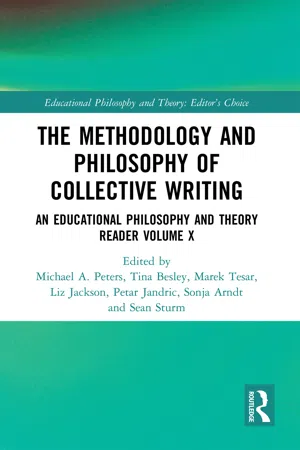
The Methodology and Philosophy of Collective Writing
An Educational Philosophy and Theory Reader Volume X
- 232 pages
- English
- ePUB (mobile friendly)
- Available on iOS & Android
The Methodology and Philosophy of Collective Writing
An Educational Philosophy and Theory Reader Volume X
About This Book
This multi-authored collection covers the methodology and philosophy of collective writing. It is based on a series of articles written by the authors in Educational Philosophy and Theory, Open Review of Educational Research and Knowledge Cultures to explore the concept of collective writing. This tenth volume in the Editor's Choice series provides insights into the philosophy of academic writing and peer review, peer production, collective intelligence, knowledge socialism, openness, open science and intellectual commons. This collection represents the development of the philosophy, methodology and philosophy of collective writing developed in the last few years by members of the Editors' Collective (EC), who also edit, review and contribute to Educational Philosophy and Theory (EPAT), as well as to PESA Agora, edited by Tina Besley, and Access, edited by Nina Hood, two PESA 'journals' recently developed by EC members. This book develops the philosophy, methodology and pedagogy of collective writing as a new mode of academic writing as an alternative to the normal academic article. The philosophy of collective writing draws on a new mode of academic publishing that emphasises the metaphysics of peer production and open review along with the main characteristics of openness, collaboration, co-creation and co-social innovation, peer review and collegiality that have become a praxis for the self-reflection emphasising the subjectivity of writing, sometimes called self-writing. This collection, under the EPAT series Editor's Choice, draws on a group of members of the Editors' Collective, who constitute a network of editors, reviewers and authors who established the organisation to further the aims of innovation in academic writing and publishing. It provides discussion and examples of the philosophy, methodology and pedagogy of collective writing. Split into three sections: Introduction, Openness and Projects, this volume offers an introduction to the philosophy and methodology of collective writing. It will be of interest to scholars in philosophy of education and those interested in the process of collective writing.
Frequently asked questions
Information
Part 1
Introduction
1 Towards a philosophy of academic publishing
Introduction
The academic journal was born in the seventeenth century with The Philosophical Transactions of the Royal Society in 1665 under the editorship of Henry Oldenburg. The Charter of the Royal Society was dedicated to ‘improving natural knowledge.’ The development of the academic journal as the cornerstone of the emerging global system of scientific communication and scholarship was closely tied to peer review and the history of the printing industry. Today academic publishing is undergoing dramatic changes as it shifts from print to electronic format and digital media, and also to video and new social media technologies.
- develop an experimental and innovative approach to academic publishing;
- explore the philosophy, history, political and legal background to academic publishing;
- build a groundwork to educate scholars regarding important contemporary issues in academic publishing; and,
- encourage more equitable collaborations across journals and editors.
1.2 New knowledge ecologies and the global ecosystem of scholarly communications1.3 The three ages of the journal—text, electronic and video communication1.4 The theory of technological disruption1.5 The digital text1.6 The rise of open access1.7 Enlightenment continuities? Universal access and democracy1.8 Ownership and rights1.9 The geographical distribution of journal knowledge1.10 Peer review: history and future1.11 Peer-reviewed open access journals: the case of APCs1.12 What do altmetrics measure? Maybe the broader impact of research on society1.13 Discussion
New knowledge ecologies and the global ecosystem of scholarly communications
Table of contents
- Cover
- Half Title
- Series Page
- Title Page
- Copyright Page
- Table of Contents
- Previously published chapters
- List of contributors
- Part 1: Introduction
- Part 2: Openness
- Part 3: Projects
- Endnote Exploring the philosophy of collective writing
- Index